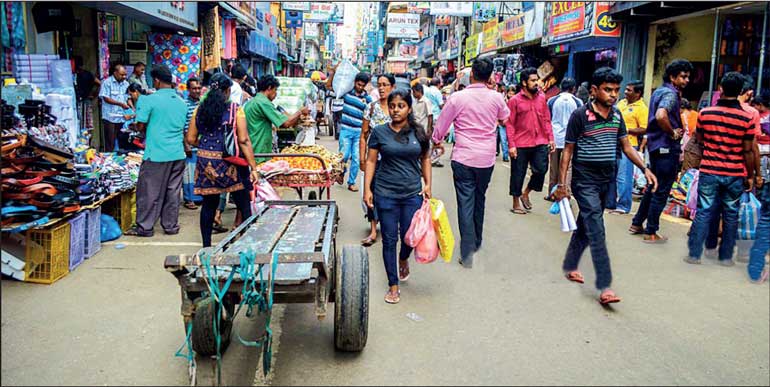Sunday Feb 22, 2026
Sunday Feb 22, 2026
Wednesday, 8 March 2023 00:03 - - {{hitsCtrl.values.hits}}

It is high time for Sri Lankans to recognise that the future success of the country depends not on one individual, but on a capable, dedicated and honest leadership team who can steer the strategic direction and progress of the nation
 An economy is a system that enables the production, distribution, and consumption of goods and services in a society. It’s a network of exchanges that involves individuals, businesses, and governments working together to fulfil the needs and wants of the population. People work to create products or services that are then exchanged or sold for money or other forms of payment. Economic growth is driven by an increase in the number of exchanges that occur within an economy.
An economy is a system that enables the production, distribution, and consumption of goods and services in a society. It’s a network of exchanges that involves individuals, businesses, and governments working together to fulfil the needs and wants of the population. People work to create products or services that are then exchanged or sold for money or other forms of payment. Economic growth is driven by an increase in the number of exchanges that occur within an economy.
The crucial issue at hand is whether policymakers have a sound understanding of this fundamental concept. Sri Lanka is currently facing a crisis due to excessive borrowing in the past, resulting in a significant debt burden without a corresponding increase in economic activity. To address this crisis, the Government has been attempting to reassure the public that everything will be resolved once the $ 2.9 billion IMF funding is approved, despite the fact that this is another loan and not a grant.
At this stage, obtaining the IMF loan is crucial to restoring the credibility that Sri Lanka lost due to unilaterally declaring bankruptcy during a period of economic turmoil. The soft default approach has created a situation where no lender other than the IMF is willing to consider providing funding to the Sri Lankan Government. While the loan may not directly spark economic activity, it will signal to other investors that the country is capable of managing its finances and may help to strengthen short-term reserves and the exchange rate. It is essential to recognise that the IMF loan alone will not be enough to generate significant economic activity in the country in the immediate term.
Constructive criticism must be accompanied by practical solutions. Sri Lanka requires a specific program that can stimulate the economy by facilitating the production, distribution, and consumption of goods and services, while also increasing exports.
A program as such should prioritise several key areas:
1. Stimulate entrepreneurship and facilitate free market competition: The Government can take a variety of measures which include, simplifying business registration processes, reducing barriers to entry, creating a favourable tax environment, offering business development services, building Infrastructure , fostering innovation, education and training for SMEs ,encouraging entrepreneurship, encourage partnerships, promoting open trade policies: , simplifying regulations, strengthening competition laws , improving access to information, facilitating access to funding. Reducing high interest rates and other associated costs and minimising heavy collateral requirements are also very important requirements for the small and medium enterprises who make up over 75% of all businesses, employ 45% of the workforce, and contribute 52% to the Gross Domestic Product (GDP).
2. Digitisation of state administration and encouraging the use of technology in all economic sectors: Digitisation subject to a comprehensive strategy can improve efficiency, reduce costs, and increase transparency whilst reducing corruption in the state administration, streamlining processes, and making Government services more accessible. Encouraging the use of technology in sectors such as agriculture, fisheries, tourism, and manufacturing can increase productivity, improve quality, and enhance the competitiveness of Sri Lankan products. Opening up Government businesses to local companies in a transparent manner will also help boost this IT industry.
3. Reforms in tax collection agencies: The Government can improve tax collection by investing in technology and modernising tax systems, simplifying tax laws and regulations to make it easier for individuals and businesses to understand and comply with tax requirements, encouraging voluntary compliance by providing incentives for taxpayers to pay their taxes on time and in full, strengthening enforcement mechanisms to deter tax evasion and other forms of non-compliance, improving tax administration and management by providing better training and resources to tax officials, engaging with taxpayers and other stakeholders to promote greater transparency and accountability in tax collection processes.
4. Controlling public expenditure and fighting corruption: To control public expenditure and fight corruption in Sri Lanka, enhanced legal provisions and regulations are crucial. Strengthening the legal framework for public procurement, introducing more stringent financial reporting requirements, increasing transparency and accountability in Government spending, and establishing an independent anti-corruption agency to investigate and prosecute corruption cases will be key.
5. Promoting an export economy: To promote an export economy across all sectors in Sri Lanka, the Government and private sector should focus on improving the competitiveness of Sri Lankan products in international markets. Sri Lanka should establish favourable trade agreements with other countries, encourage foreign direct investment and facilitate access to finance for small and medium-sized enterprises to boost exports. Finally, promoting sustainable and eco-friendly production practices can help differentiate Sri Lankan products in the global market.
6. Make investment promotion a priority for all state institutions, provincial councils, and local authorities: Promoting investment is crucial for attracting foreign capital, creating jobs, and promoting economic growth. All state institutions, provincial councils, and local authorities should prioritise investment promotion by providing support services, simplifying regulations, and offering incentives. Fostering an investment-friendly environment can improve the country’s image and attract more investors.
7. Efficient and effective management of state resources and public institutions: Efficient and effective management of state resources and public institutions is essential for ensuring the delivery of public services and promoting economic development. This can be achieved by introducing performance-based management systems, improving accountability, and reducing bureaucracy. Promoting transparency and stakeholder participation can also improve governance and public trust.
8. Prioritise the development of human capital at the state level : Human capital development would include, Investing in education and skills development programs that support the country’s economic growth, developing training programs to enhance the skills of the workforce, particularly in sectors important for job creation and economic growth, promoting entrepreneurship and innovation by providing training and resources to aspiring entrepreneurs and small businesses, implementing programs that address social and economic inequality issues, ensuring all citizens have equal access to education and training opportunities, fostering a culture of lifelong learning and continuous skills development to support ongoing economic development
9. Broadening the capital markets and facilitating access to finance: The Government should facilitate access to finance for all types of businesses by creating a favourable regulatory environment, promoting new financial instruments to broaden the range of opportunities available to investors, working with banks to provide loans and other financing options to small and medium enterprises , encouraging the development of venture capital and private equity funds to provide financing to start-ups and small businesses, establishing credit guarantee schemes to reduce the risks associated with lending, enhancing financial literacy to improve awareness and understanding of capital markets and financing options among the business communities particularly amongst the MSMEs
10. Effective management of monetary and exchange rate policies: To effectively manage monetary and exchange rate policies in Sri Lanka and steer economic growth, the Government should adopt a balanced approach that balances inflation control with growth promotion. This can be achieved by implementing appropriate monetary policy tools, such as interest rate adjustments and reserve requirement changes, to achieve desired levels of inflation and stabilise the currency. The Government may intervene in the foreign exchange market as and when required to smooth out fluctuations whilst keeping its interventions to the bare minimum.
How often do we hear political leaders discussing this broader perspective? If they lack a comprehensive understanding of how to revive the economy, how can we expect their supporters to have one?
Sri Lanka’s lack of strategic leadership at the national level has always been a hindrance to the country’s progress. The absence of a commonly agreed long-term vision at cabinet level, coupled with the ever-changing goal posts, has further exacerbated the problem. Poor communication and implementation between policymakers and senior Government officials responsible for carrying out policy decisions only add to the issue. Despite the numerous policy documents, an analysis of annual reports shows that there is no correlation to what is implemented.
Lee Kuan Yew, Singapore’s founding father, believed that Meritocracy, Pragmatism, and Honesty were essential for his country’s success. Meritocracy meant that people should be given opportunities based on their abilities and merits, rather than social status or wealth. Pragmatism meant that policies and decisions should be based on practical considerations, not ideology. Honesty meant that leaders and citizens should be transparent, ethical, and accountable. These values formed the foundation of Lee Kuan Yew’s vision for Singapore, and have helped the country become a global hub for business, innovation, and education.
Sri Lanka’s progress towards a prosperous future demands a fundamental shift in the approach to leadership. The Singaporean model of prioritising Meritocracy, Pragmatism, and Honesty can serve as a valuable lesson for Sri Lanka’s policymakers. By creating a strong leadership team at the top, Sri Lanka can effectively harness its talent and maximise its potential. It is high time for Sri Lankans to recognise that the future success of the country depends not on one individual, but on a capable, dedicated and honest leadership team who can steer the strategic direction and progress of the nation.
(The writer is a Member of Parliament.)